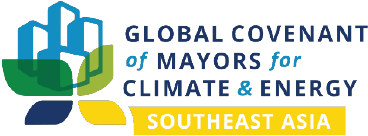Today the IUC Asia held its final webinar on Climate Action Plan development in Vietnam. Since February 2020, the IUC Asia program of the European Union has been providing technical assistance and support to three pilot cities in Vietnam (Can Tho, Da Nang, Tam Ky) for the development of their Climate Action Plans (CAPs) that are in line with Global Covenant of Mayors’ Common Reporting Framework (GCoM CRF). The technical assistance is being implemented through the cooperation with the UN Habitat and CDP as the technical partners.
The CAP development in these three pilot cities has arrived at the finish line and Vietnam showcased the pilot cities’ CAPs that they have developed throughout the IUC Asia program. Reflections and discussions about the challenges and lesson-learned, especially for future EU cooperation, along with a review of the progress from IUC Asia’s last mid-term monitoring were held today. In the future, the end result of CAP development with IUC Asia program will become references for replication in other GCoM cities.
Actions from Vietnam cities and urban centers are crucial to achieving the national and global targets for climate change. Accelerating urbanization presents challenges to Vietnamese cities, in particular secondary ones, as they struggle to support sustainable, inclusive economic growth and remain resilient. Cities are major drivers of economic development and growth in Vietnam, as about 70% of GDP is generated in urban areas while it is expected that until 2040, about 50% of Vietnam’s population will live in urban areas. Therefore, climate actions in Vietnam cities are crucial since (1) approximate 75% of the urban population in Vietnam are living in low-elevation coastal zones, and (2) the changing lifestyle and carbon-intensive energy mix may increase the GHG emission per capita by 3.5 tonnes CO2e to ten-fold consistent to the projected 10 times GDP growth rate increase from 2010-2050.
The webinar began with opening words from Rui Ludovino, Policy Officer of the EU Delegation to Vietnam, highlighting the important work done under the technical assistance of the EU IUC Asia programme with the Ministry of Natural Resources and Environment (MONRE), in partnership with UN Habitat and the CDP. He stated, “Climate Change is at the top of the EU agenda. The EU recently adopted the European Green Deal, as the new growth strategy for Europe. The Green deal puts the efficient use of resources at the heart of our recovery. The Green Deal will rethink and modify all aspects of the European economy and society towards achieving the target of zero net emissions by 2050.”
Mr Ludovino further stressed, “We take climate change seriously and want to work closely with Vietnam to also mitigate, adapt and build resilience to climate changes. In this sense, the work carried out under IUC, and in particular, the efforts the EU makes to extend the Global Covenant of Mayor for Energy and Climate (GCoM) to as many cities and countries as possible is important. It is cities that are at the heart of the fight on climate change and they are the best placed to accelerate the reduction of emissions in many sectors as well as increase preparation to resist and overcome climate change. The recent floods in Vietnam have shown how important it is to have a plan and measures in place – imagine what it could be if we also built elements that reduce risks and use resources efficiently when we plan the urban development of our cities. This is why the work on Climate Action Plans is so important. In this sense, the EU will make available resources under the GCoM to support cities in their Climate Action Plans from 2021 until 2024.“
Pham Van Tan, Deputy Director of Dept. of Climate Change at the Ministry of Natural Resources and Environment (MONRE) provided welcoming remarks from the Vietnamese side.
Paolo Bertoldi, EU Joint Research Centre, explains the benefits of CAPs. Maria Adelaida Antonette of UN Habitat delivered key messages and lessons learned from developing CAPs in Vietnam. Hanah Paik of CDP discussed greenhouse gas (GHG) inventory results in Vietnam. With domestic resources, by 2030, Viet Nam will have reduced total GHG emissions by about 9%, equivalent to 83.9 million tons of CO2eq. Dinh Diep Anh Tuan (Dragon Institute and Department of Natural Resources and Environment) of Can Tho City explains, “Climate actions in our cities are crucial since an approximate 75% of the urban population in Vietnam are living in low-elevation coastal zones.” Nguyen Thi Kim Ha (Dept. of Natural Resources and Environment) of Da Nang City presented adaptation goals, such as improving road drainage & water supply infrastructures to address the impacts of climate change, improving capacity to mitigate risks from flooding, improving land-use management. Le Ngoc Phu (Div. of Natural Resources & Environment) of Tam Ky City presents potential mitigation action targets for the CAP such as:
- Energy -> 5% reduction
- Transportation -> 10% increase of public transport
- Water -> 5% water loss reduction
- Waste -> separation, minimize plastic
In closing, Raul Daussa and the rest of the IUC Asia team expressed their gratitude to the EU Delegation in Vietnam, the EU Joint Research Centre and Foreign Policy Instruments, the Vietnamese Ministry of Natural Resources and Environment, UN Habitat and CDP for supporting the IUC Asia programme activities in Vietnam within the Global Covenant of Mayors initiative.

















